- Home
- Neal Shusterman
Game Changer Page 3
Game Changer Read online
Page 3
“Blue,” she said. “Just . . . regular blue.”
“So, no shades of any other color?” I prompted. “Like maybe . . . red?”
She furrowed her eyebrows and took a deep breath, like she sensed the coming of a storm. She closed her computer. “Are you feeling all right, Ash?”
“I’m fine,” I snapped. “I just asked a question. Why do you have to go and think something’s wrong just because I ask a question?”
She kept her cool, even though I hadn’t. “Because it’s a strange question,” she said.
I opened my mouth to argue how unstrange this question was, but realized it was no use. The more I tried to defend it, the stranger it would seem.
“Never mind,” I told her, “it was just a question.” And I went to my room giving her no explanation, because there was no explanation to be had. I kept trying to tell myself how unimportant this was, and how ridiculous I was being, but there was a deeper truth here. Even the tiniest loose thread in the fabric of your world cannot be tolerated. Either everything works, or nothing works.
My odd headache never entirely went away, and now it reached that threshold where I noticed it again. I thought I might take some Advil, but was too focused on this loose thread. I went to my computer and did a search on stop sign images. Needless to say, they were all blue. I shouldn’t have been shocked, but I was. And it wasn’t just signs. Stoplights had three colors. Green, yellow, and blue—which I hadn’t noticed while driving because I must have had all green lights.
And here’s the thing that was strangest of all: the more I looked at it, the more normal it seemed. The more I considered it, the more memories I had that verified what the images were showing me. But right beside those memories were red signs and red lights—and trying to imagine them both at once made my head resonate like it does when someone squeaks a balloon. I gave up and hurled myself on my bed. I was tired, that’s all. Tired and wired from a long day. It would all make sense tomorrow. It would pass. And in the morning, I’d realize that everyone was right. Stop signs had always been blue, and I must have been seriously tweaked to think otherwise.
2
Sideways
Red is the color of blood. The color of danger. Which means, if there’s such a thing as intuition, I should have been seeing red everywhere.
I spent my lunch on Monday in the school library, looking up the history of road signs. I was obsessed now. It would have been easy to just let it go, and treat it like “one of those things,” but I’m too much of a pit bull for my own good.
The history of road signs is much more interesting than you might think. Apparently, the color blue was chosen over red for two reasons. First, because of concerns over red-green color blindness. Second, because red invokes anger in mammals. It’s the reason why matadors flash red capes in front of bulls. It doesn’t make them stop; it makes them charge. Red lights and signs, it was reasoned, would make for angry drivers. So, in 1954 the American Manual on Uniform Traffic Control Devices adopted blue as the universal color of “halt.” The only place I could find stop signs that were actually red was Hawaii—and only on roads that were privately owned—because by Hawaiian law, the official blue signs are allowed only on public roads.
It all seemed to make sense, and had an internal logic. It’s just that its internal logic seemed to exclude me, and the world I thought I knew.
Katie caught me researching during lunch. I told her I was doing a report on road signs.
“Fun,” she said with “meh” kind of sarcasm. “What class?”
I was almost stumped by that, and rather than giving her a dumb I-really-haven’t-thought-this-out look, I said, “Math,” proving that I really hadn’t thought this out.
“Road signs for math?”
“I’m . . . uh . . . crunching traffic accident statistics, and how they relate to signage,” I said. Kudos to me for pulling something coherent out of my ass.
“Sounds more interesting than algebra,” she said.
And suddenly I had an overwhelming urge to confide in her. Maybe that was because she and I already shared a secret, albeit a stupid one.
Long story short, when I was in fifth grade, on the way to school, I ran over a squirrel on my bike. How the hell a squirrel could be slow enough to get caught under a bicycle tire is beyond me, but it did. I skidded to a halt and went back to it, not yet realizing that the roadkill writing was already on the wall. When I picked it up, it was still alive. It opened its mouth and closed it twice, like it was underwater, gasping for air. Then it shivered and died right there in my hands. You might be thinking “Big effing deal, critters die every day.” But when was the last time something died on you? And don’t talk to me about hunting, because that’s different; you know when you go out that it’s your intent to kill. But when something unexpectedly dies in your hands and it’s looking at you with those what-the-fuck-did-I-ever-do-to-you kind of eyes, it hits you in unpredictable ways. I suddenly burst into tears, talking to the thing like it could still hear me. “I’m sorry, I’m sorry,” I whimpered. “I didn’t mean it!” Then I look up, and there’s Katie watching the whole thing.
I thought she’d say something mean, like “What kind of monster kills a squirrel?” Or maybe she’d laugh at me for my very uncool waterworks. But instead she said, “We should bury it.”
Not “you,” but “we.” With one word she turned a sad, solitary accident into a cover-up conspiracy.
We buried the squirrel in an unmarked grave in a nearby yard where we knew the owners didn’t have a dog that might dig it up. Neither of us spoke of it again, but ever since then, I kind of felt an odd connection with her. And all because she caught me crying over a dead rodent, and never told anyone.
So maybe she wouldn’t tell anyone about this, either. And maybe the “I” could become a “we” again, so I wouldn’t feel so entirely alone in this.
I pulled up a slew of blue stop sign images for her. “Funny, but I always thought that stop signs were red,” I said in an offhand kind of way.
She looked at me for a moment—not stumped or confused, but pensive. Then she nudged me aside and got on the computer, doing a search of her own. In a few seconds a picture of a dress popped up.
“A while back there was a big controversy over the colors of this dress. What do they look like to you?”
It was pretty obvious. I wondered if it was some kind of trick.
“It’s white with gold stripes,” I told her. “Duh.”
She shook her head. “That’s not what I see. When I look at that same picture, I see a blue dress with black stripes.”
I looked at it again. “That’s crazy. You’re kidding me, right?”
“Nope. And it’s not just me. Thirty percent of people see the dress like I do, and seventy percent see it the way you do. The point is, different people see the world in different ways . . . so who’s to say if your red is everyone else’s blue?”
It was the most comforting explanation yet. I wanted to thank her for it, but felt it would get awkward really quickly if I expressed the level of emotion I was actually feeling, so I just said, “That makes sense.”
She smiled and left, satisfied to have solved my little dilemma. I watched as she walked away, then looked around to see if anyone else was watching me watch. Then I took a deep breath, let it out, and made the conscious decision to let the whole thing go. I had better things to do than get stuck in a mental riddle that I knew I’d never be able to solve. Katie’s explanation made sense. Or at least sense enough to cling to.
But before I left the library, I stopped a passing student. “Hey,” I said. “What color is your shirt?”
He looked at it. “It’s red.”
Which is exactly how I saw it, too.
Practice that day was hard. It always was—but even as hard as our practices were, games have a certain energy level that practices don’t reach. See, practice is just that. It’s a projection into the future. It’s about being strong enough and skilled enough to compete. But in a game, you’re living in the moment; everything is sharper and every second comes at you harder. In other words, while I might hit hard in practice, the hits on game day have a completely different feel. A world-changing feel.
So on Monday, there was no repeat of that power hit. No ice in my veins, no lost time. It was just a normal exhausting practice. But it cleared my mind for a while, which was a good thing. I didn’t have to worry whether or not I had some weird undiagnosed color blindness, or if I was losing my mind from too much brain-rattling.
Then, when I got home, new drama.
I discovered that my brother, Hunter, had erased my game file for WarMonger 3 to create a new file for himself.
“I didn’t mean to,” he pleaded. “It didn’t tell me it was saving over your file until it was too late.”
This might seem microscopically unimportant in the grand scheme of things, but at the moment, I wasn’t about grand schemes—and in the minor scheme of me, it was a big deal. WarMonger 3, as I’m sure you know, is one of those games you wait years for, and is so complex, you spend maybe six months trying to beat it. I was well into my fifth month.
The game has three “save” slots, two of which were already hogged by other campaigns that Hunter was running. When you try to save over an existing file, the game asks, “Are you sure you want to obliterate this file?” and if you click “Yes,” it flashes a big red stop sign, which I suppose is now blue, and says in all caps, “WARNING! IF YOU ERASE THIS FILE, IT CANNOT BE UNDONE.” So basically only a total idiot could accidentally erase it. And in spite of the fact that I would often call him one, Hunter was not a total idiot. Which meant he might have done this on purpose.
“I always click too fast, without reading,” Hunter blur
ted. “You always say that.” His face was flushed as he spoke, he kept his distance, and he stayed on the balls of his feet in case I lunged at him, and he had to make a quick escape. I couldn’t tell whether the redness in his face was from him being upset with himself, or if he was trying to make me think he was upset with himself.
My first instinct was to pound him, but I had to restrain myself. Hunter was three years younger than me. Exactly so—we both have the same birthday, which neither of us liked, since neither of us was big on sharing. I had hit my growth spurt, but he hadn’t, and I was so much bigger than him now, hitting him could do some real damage.
My second instinct was to erase all of his files, but then I realized he would have anticipated this, and maybe didn’t care. It was quite possible that he was done with the game, which meant that my retaliation would have no effect at all. He’d win, and would secretly gloat that he had completely duped and manipulated me.
At this point, you may feel I was overthinking this—but if you do, then you’ve never experienced the mind-boggling actions of a passive-aggressive sibling.
Case in point: three months ago.
A bunch of friends and I were going to see the band Konniption in concert. They actually broke up the day after the gig, so it would be the last time anyone would ever see Konniption perform.
And I lost my ticket.
Usually that wouldn’t be a problem. You just print out a new one, right? But one of the band’s eccentricities was that you had to actually go down to the stadium and wait in a physical line, to get physical tickets, as an intentional throwback to the early days of rock and roll. And my ticket had vanished.
“Your room’s such a mess; how can you find anything?” my mother had pointed out. This was true, but if it was a mess before, that was nothing compared to the debris field left behind after I tore through my room like a tornado searching for that stupid piece of paper.
Ticketless, I went with my friends anyway to plead my case at the entrance, but, of course, no one at the gate cared, or even believed me. I ended up spending the whole night sitting in the car, listening to my Konniption playlist, and pretending I was inside hearing them live.
It didn’t occur to me until a week later that maybe I didn’t lose that ticket at all.
One night while Hunter was off at a friend’s house, I did a much less destructive search of his room for my ticket, on a hunch. I found it—it was in his top desk drawer beneath some old homework. He hadn’t even hidden it well.
I was furious, but by the time he got home, my anger had turned to sad bewilderment.
“Why?” I asked him. “Why would you do that?”
At first he claimed he found it after the concert, but even he knew that story had no wings to fly. Finally he got red and teary-eyed and said, “You could have gotten me a ticket, but you didn’t even think to ask me, did you? I would have paid with my own money, too.”
“So you made sure that I couldn’t go out of spite?”
“I was gonna give it back to you,” he insisted. “I just wanted to freak you out for a while.”
“So why didn’t you give it back?”
He looked down. “Remember when I came to talk to you while you were tearing apart your room? ‘Maybe you’re looking in the wrong place,’ I said. And I asked if I could help.”
I did remember that. I was already so worked up that I told him to get the hell away from me. And when he wouldn’t go, I chucked a moldy sandwich at him. So he left.
“I was gonna drop it behind your desk, then pull the desk out, and let you find it,” he told me. “But you didn’t want my help. So you didn’t get it.”
Of course none of that excused what he had done. “I swear, Hunter, sometimes it’s like I don’t even know you,” I told him. His answer to that still makes me shiver.
“You don’t,” he said. “You’ve never even tried.”
I didn’t tell Mom and Dad about the ticket. These kinds of things are between brothers. Instead I installed a better lock on my door—one with a code that no one knew but me. Which made my parents suspicious about what I might be doing in there, but then, if your parents aren’t a little paranoid, you’re not doing your job.
The thing is, no one ever fully trusts their siblings—that’s normal—but you do trust them to have your back when it really counts. Hunter and I didn’t even have that.
So did Hunter erase my WarMonger 3 file on purpose? You tell me.
“You can use one of my files,” he offered, never actually saying the words “I’m sorry” throughout his whole apology. “I wasn’t as far as you on any of them, but it’s better than nothing.”
At the moment I was still reeling from the loss, thinking about all that wasted time that I’d now have to waste all over again. But I thought about Hunter, and the way he was playing me. It was the same way he played checkers when he was little; stealing pieces off the board when I wasn’t looking. The only way to win was to walk away and deny him the victory. So I took a deep breath and swallowed my anger.
“No worries,” I told him. “I didn’t really like that game anyway.”
He was expecting a storm from me; my response threw him off. “But . . . but you said WarMonger 3 was better than the first two combined.”
I shrugged. “Did I? I don’t remember.” Then I left the room and didn’t look back at him, for fear that he might read some true feelings in my face.
How did you get this way, Hunter? I wanted to ask him, but never did. Maybe he got it from Dad, who always seemed to take pleasure in selling people auto parts that they didn’t need, at inflated prices. Or maybe from Mom, and the way she was so thrilled by the Christmas blizzard last year, because it meant that our neighbors’ big expensive Caribbean vacation—the kind that we could never afford—was now a big expensive series of canceled flights.
Not that I’m perfect—I’m sure I have plenty of my parents’ bad traits—but taking pleasure in the misfortune of others is not one of them. Unless you count humiliating an opposing team.
Although losing a virtual game world was unimportant, it still stung. What I needed was something to ground me a little more firmly in my real world. Some comfort food for the soul—and for the stomach, too.
There was a standing rule that any time Leo’s mom made her famous lobster mac and cheese, I was invited. I never felt guilty eating a lot of it, because, according to Mrs. Johnson, it wasn’t as fancy as it sounded. A bag of frozen Costco lobster meat went a long way, so feeding a family of four, plus one hungry freeloader, cost less than fast food.
“Did you know that lobster used to be what poor people ate in the Northeast?” Leo said as we ate. “Then somebody got the bright idea to market it to New York socialites, and suddenly it became rich-people food.”
“It’s all about perception,” his father said. Mr. Johnson was an exec at a marketing company, so he knew what he was talking about. “You could sell bird turd on toast if the right people were seen eating it.”
“Dad,” complained Angela, “you’re not helping our appetites.”
“I’m just saying.”
“A little less saying, a little more eating,” Mrs. Johnson said. “Leftovers are not our friend today—one more piece of Tupperware, and we’ll lose our latest game of refrigerator Tetris.”
After dinner Leo and I went down to the basement, where they had a decent man cave, although Angela always said she resented the implied exclusion, threatening to paint the place pink.
“You hate pink,” Leo had reminded her.
“Some points are worth a little suffering,” she had responded.
Monday night’s game had already started—the Colts versus the Jaguars. I claimed a recliner and sank into it. I thought I’d be able to settle into my comfort zone here, but some things find you wherever you try to hide.
“Wait—what team is that?” I asked, pointing at the TV, where a team in purple was getting ready for the next play.
“The Colts, who else?”
“But the Colts are blue. Blue and white.”
Leo looked at me funny. “No, the Jets are blue and white.”
“They’re green and white!”
“You’re thinking of the Vikings.”
I launched myself out of the recliner. “No! They’re the ones who are purple!”

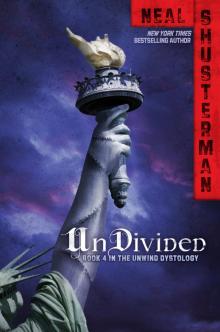 UnDivided
UnDivided UnBound
UnBound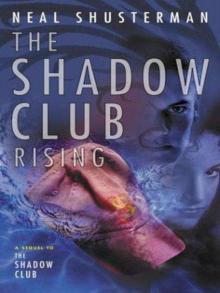 The Shadow Club Rising
The Shadow Club Rising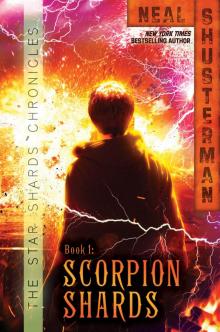 Scorpion Shards
Scorpion Shards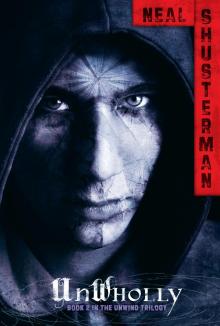 UnWholly
UnWholly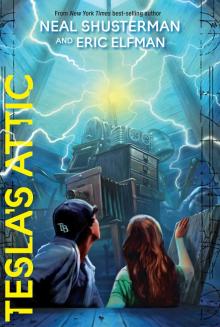 Tesla's Attic
Tesla's Attic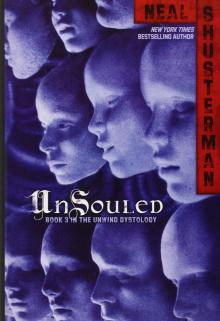 UnSouled
UnSouled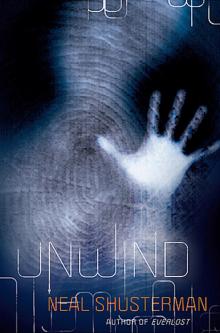 Unwind
Unwind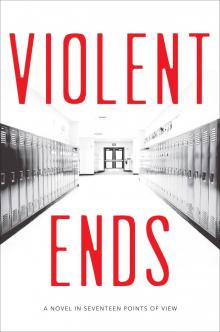 Violent Ends
Violent Ends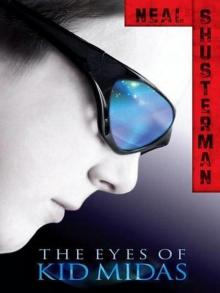 The Eyes of Kid Midas
The Eyes of Kid Midas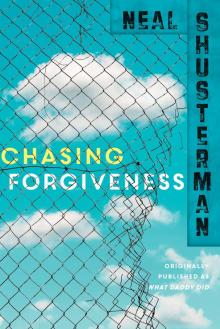 Chasing Forgiveness
Chasing Forgiveness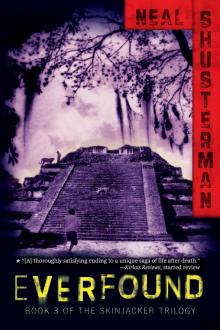 Everfound
Everfound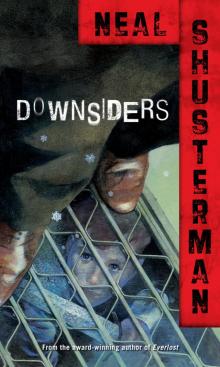 Downsiders
Downsiders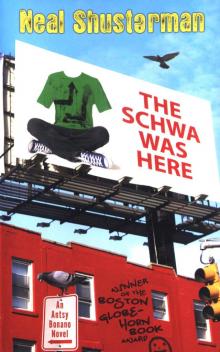 The Schwa Was Here
The Schwa Was Here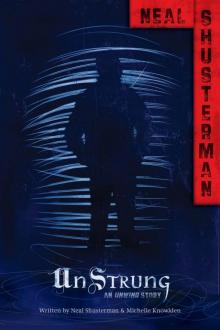 UnStrung
UnStrung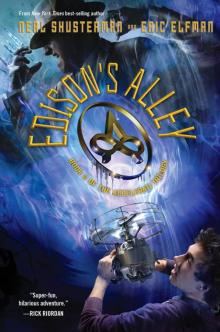 Edison's Alley
Edison's Alley Duckling Ugly
Duckling Ugly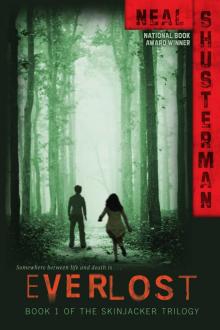 Everlost
Everlost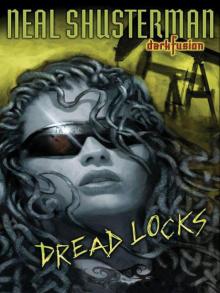 Dread Locks
Dread Locks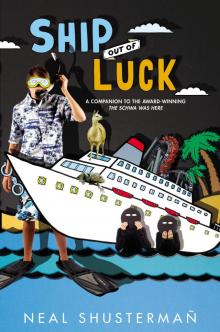 Antsy Floats
Antsy Floats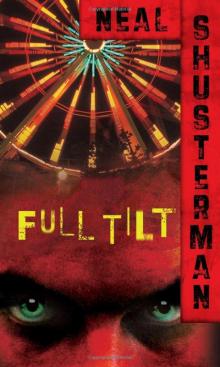 Full Tilt
Full Tilt Thunderhead
Thunderhead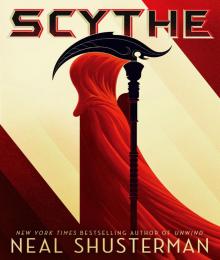 Scythe
Scythe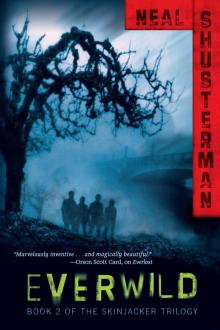 Everwild
Everwild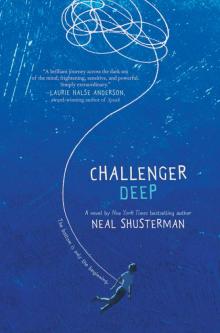 Challenger Deep
Challenger Deep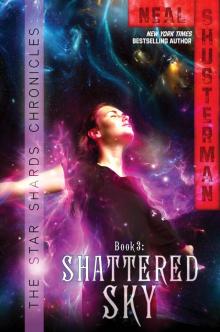 Shattered Sky
Shattered Sky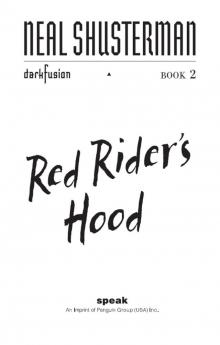 Red Rider's Hood
Red Rider's Hood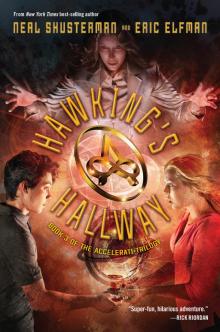 Hawking's Hallway
Hawking's Hallway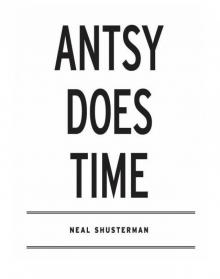 Antsy Does Time
Antsy Does Time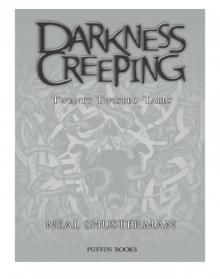 Darkness Creeping: Twenty Twisted Tales
Darkness Creeping: Twenty Twisted Tales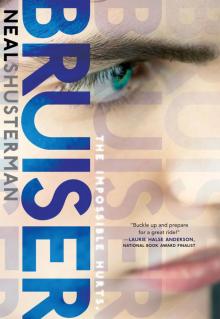 Bruiser
Bruiser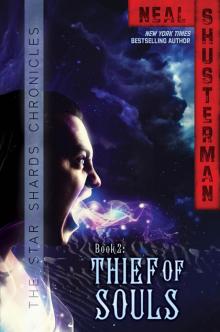 Thief of Souls
Thief of Souls The Toll
The Toll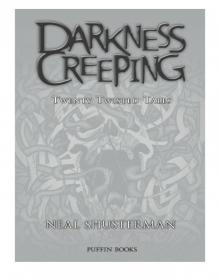 Darkness Creeping
Darkness Creeping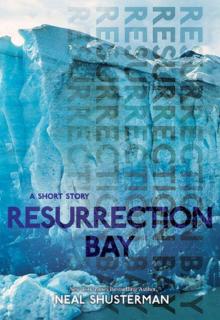 Resurrection Bay
Resurrection Bay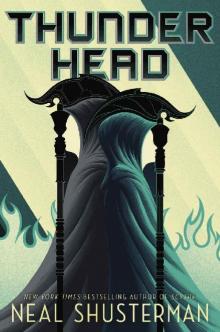 Thunderhead (Arc of a Scythe Book 2)
Thunderhead (Arc of a Scythe Book 2)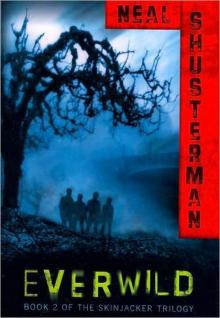 Everwild (The Skinjacker Trilogy)
Everwild (The Skinjacker Trilogy)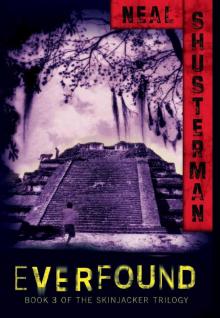 Everfound s-3
Everfound s-3 Edison’s Alley
Edison’s Alley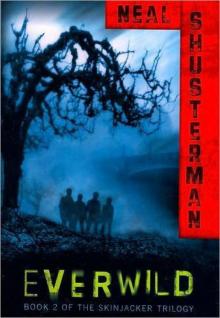 Everwild s-2
Everwild s-2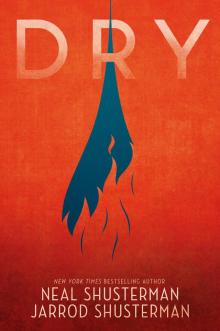 Dry
Dry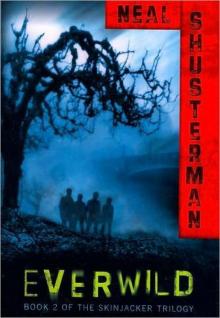 Skinjacker 02 Everwild
Skinjacker 02 Everwild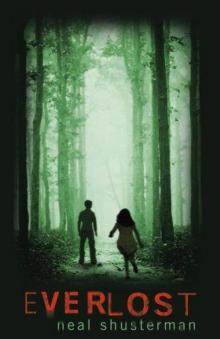 Everlost s-1
Everlost s-1